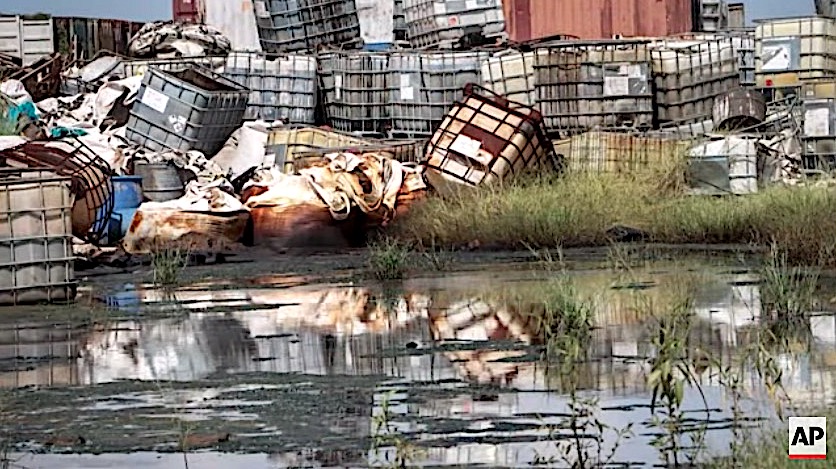South Sudan, Chinese oil interests buried 4 reports of deadly, disfiguring toxic oil contamination, AP reports


A free daily email with the biggest news stories of the day – and the best features from TheWeek.com
You are now subscribed
Your newsletter sign-up was successful
South Sudan's government and the two dominant oil companies in the impoverished nation, Dar Petroleum and Greater Pioneer, have buried at least four environmental reports since 2013 that show serious water and soil contamination in two states with high rates of infertility, miscarriage, alarming birth defects, and unexplained deaths, Sam Mednick reports at The Associated Press. Doctors and residents in oil-rich Union and Upper Nile states report children born without heads, with intestines outside their bodies, and nonfatal deformities like too many fingers and not enough limbs. Dar Petroleum was ordered to clean up its toxic oil mess in Upper Nile in 2018, but residents and industry insiders say the company never acted.

Dar Petroleum and Greater Pioneer are both conglomerates controlled by Chinese state oil companies, with Sudan's state-run oil firm and companies from Malaysia, India, and Egypt. The first two reports AP obtained from people with close knowledge of the oil operations were compiled by Sudan's oil and health ministries in 2013 and 2016. Dar Petroleum and Greater Pioneer conducted their own separate studies in 2018, both finding significant toxic contamination and health issues in the areas. "The people who provided the reports to AP said they were purposely buried," Mednick reports. "An AP reporter looking into the pollution and health issues was detained and questioned by government officials and government security forces working on behalf of the oil companies"
There is no conclusive evidence that the mercury, manganese, arsenic, and other toxins found in the soil and water in Unity and Upper Nile caused these high rates of health problems, but the hidden reports and outside health experts draw a direct line. Neither company responded to AP's many requests for response. Oil is the only significant export from South Sudan, a country formed nine years ago then mired in civil war. It accounts for 40 percent of GDP. Read more at The Associated Press.
The Week
Escape your echo chamber. Get the facts behind the news, plus analysis from multiple perspectives.

Sign up for The Week's Free Newsletters
From our morning news briefing to a weekly Good News Newsletter, get the best of The Week delivered directly to your inbox.
From our morning news briefing to a weekly Good News Newsletter, get the best of The Week delivered directly to your inbox.
A free daily email with the biggest news stories of the day – and the best features from TheWeek.com
Peter has worked as a news and culture writer and editor at The Week since the site's launch in 2008. He covers politics, world affairs, religion and cultural currents. His journalism career began as a copy editor at a financial newswire and has included editorial positions at The New York Times Magazine, Facts on File, and Oregon State University.
-
 The Olympic timekeepers keeping the Games on track
The Olympic timekeepers keeping the Games on trackUnder the Radar Swiss watchmaking giant Omega has been at the finish line of every Olympic Games for nearly 100 years
-
 Will increasing tensions with Iran boil over into war?
Will increasing tensions with Iran boil over into war?Today’s Big Question President Donald Trump has recently been threatening the country
-
 Corruption: The spy sheikh and the president
Corruption: The spy sheikh and the presidentFeature Trump is at the center of another scandal
-
 TikTok secures deal to remain in US
TikTok secures deal to remain in USSpeed Read ByteDance will form a US version of the popular video-sharing platform
-
 Unemployment rate ticks up amid fall job losses
Unemployment rate ticks up amid fall job lossesSpeed Read Data released by the Commerce Department indicates ‘one of the weakest American labor markets in years’
-
 US mints final penny after 232-year run
US mints final penny after 232-year runSpeed Read Production of the one-cent coin has ended
-
 Warner Bros. explores sale amid Paramount bids
Warner Bros. explores sale amid Paramount bidsSpeed Read The media giant, home to HBO and DC Studios, has received interest from multiple buying parties
-
 Gold tops $4K per ounce, signaling financial unease
Gold tops $4K per ounce, signaling financial uneaseSpeed Read Investors are worried about President Donald Trump’s trade war
-
 Electronic Arts to go private in record $55B deal
Electronic Arts to go private in record $55B dealspeed read The video game giant is behind ‘The Sims’ and ‘Madden NFL’
-
 New York court tosses Trump's $500M fraud fine
New York court tosses Trump's $500M fraud fineSpeed Read A divided appeals court threw out a hefty penalty against President Trump for fraudulently inflating his wealth
-
 Trump said to seek government stake in Intel
Trump said to seek government stake in IntelSpeed Read The president and Intel CEO Lip-Bu Tan reportedly discussed the proposal at a recent meeting
